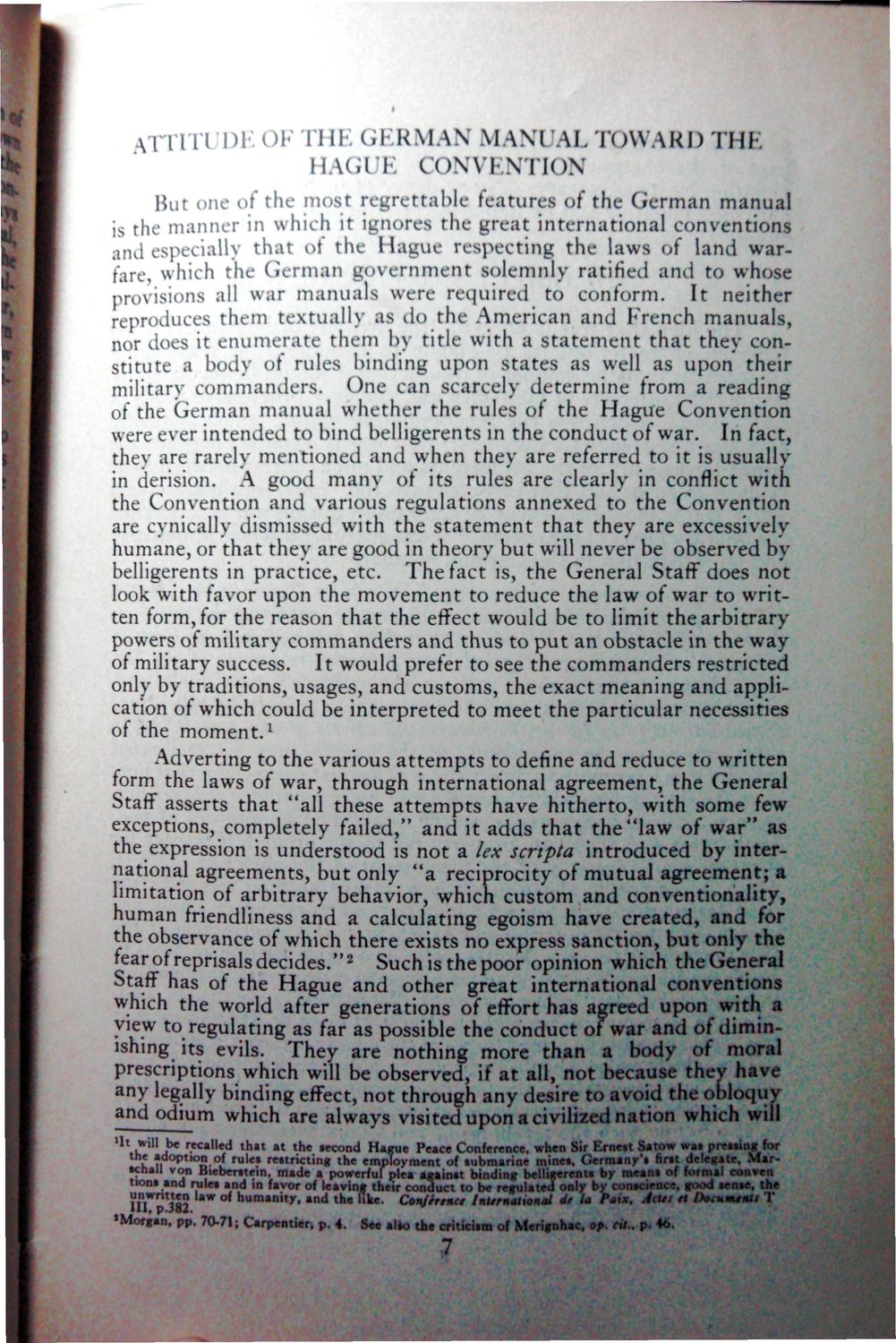| |
| |
Caption: War Publications - WWI Compilation 1923 - Article 14
This is a reduced-resolution page image for fast online browsing.

EXTRACTED TEXT FROM PAGE:
• VITITUDE OK T H K G K R . \ 1 A N MANUAL T()VVARD T H E HAGUE C O N V E N T I O N But one of the most regrettable features of the German manual is the manner in which it ignores the great international conventions and especially that of the Hague respecting the laws of land warfare, which the German government solemnly ratified and to whose provisions all war manuals were required to conform. It neither reproduces them textually as do the American and French manuals, nor does it enumerate them by title with a statement that they constitute a body of rules binding upon states as well as upon their military commanders. One can scarcely determine from a reading of the German manual whether the rules of the Hague Convention were ever intended to bind belligerents in the conduct of war. In fact, they are rarely mentioned and when they are referred to it is usually in derision. A good many of its rules are clearly in conflict with the Convention and various regulations annexed to the Convention are cvnicallv dismissed with the statement that they are excessivelv humane, or that they are good in theory but will never be observed by belligerents in practice, etc. The fact is, the General Staff does not look with favor upon the movement to reduce the law of war to written form, for the reason that the effect would be to limit the arbitrary powers of military commanders and thus to put an obstacle in the way of military success. It would prefer to see the commanders restricted only by traditions, usages, and customs, the exact meaning and application of which could be interpreted to meet the particular necessities 1 of the moment. Adverting to the various attempts to define and reduce to written form the laws of war, through international agreement, the General Staff asserts that "all these attempts have hitherto, with some few exceptions, completely failed," and it adds that the "law of war" as the expression is understood is not a lex scripta introduced by international agreements, but only "a reciprocity of mutual agreement; a limitation of arbitrary behavior, whicn custom and conventionality, human friendliness and a calculating egoism have created, and for the observance of which there exists no express sanction, but only the 2 fear of reprisals decides." Such is the poor opinion which the General Staff has of the Hague and other great international conventions which the world after generations of effort has agreed upon with a w to yif. . regulating as far as possible the conduct of war and of diminishing its evils. They are nothing more than a body of moral prescriptions which will be observed, if at all, not because they have any legally binding effect, not through any desire to avoid the obloquy and odium which are always visited upon a civilized nation which will »It will be recalled that at the second Hague Peace Conference, when Sir Erneit Satow was pressing: for tfte adoption of rules restricting the employment of submarine mines, Germany*! first delegate. Marscnall von Bieberstein, made a powerful plea against binding belligerent! by means of formal conven tions and rules and in favor of leaving their conduct to be regulated only by conscience, good sense, the Wnt III 382 hum*n>tr, and the like. Coherence International de la Patx, Actts et l*(um**tt T •Morgan, pp. 70-71; Carpentier. p. 4. See alio the criticism of Merignhac, op. ctt,. p. 46. 7
| |